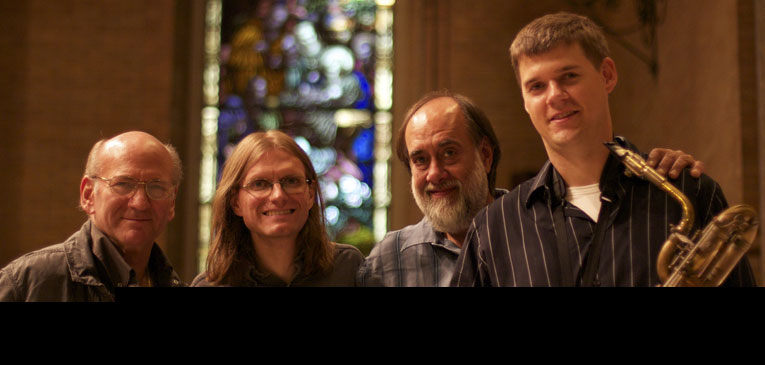Charles Evans Quartet
The Charles Evans Quartet presents the seasoned baritone saxophone artist as a unique voice in the creative music community. Two compositions to date, ‘Subliminal Leaps’ (More is More 2013) and ‘On Beauty’ (More is More 2015), were written specifically for soprano saxophone great David Liebman. Evans has devised methods of combining chromatic harmony with improvisation, employing the rare combination of the baritone and soprano saxophones.
Each subsequent recording Evans has released shows that he is continuing to go deeper into the development of a very personal approach both to playing his instrument and composing music perfectly suited to his playing style. As his work progressed, even the very open term ‘jazz’ had begun to seem too confining a term to describe his music. It cannot be adequately described with a genre label. He has arrived at the point of simply sounding like Charles Evans. His work is highly expressive and often complex, but not in a way that aims to overwhelm. He achieves all through the subtlety and control that comes from years of single-minded pursuit of ideals without compromise.
The baritonist has worked diligently to broaden the expressive range of his instrument, with specific care towards the difficult altissimo register as well as the application of chromatic improvisation/composition on the big horn. The music is strengthened by the use of freely associated triads, intervals, and chromatic lines in polyphonic improvisation with the other members of the group. The quartet members truly leave their egos at the door, beautifully expressing and understanding the composer’s musical vision.
Evans’ music is genre nonspecific and avoids employing the traditional jazz vocabulary. The combination of jazz instruments, 20th century classical techniques and harmonies, and free improvisation demonstrate Evans’ refusal to be limited or allow his music to be pigeonholed. A preference for the subtle and delicate is often demonstrated, vs. traditional jazz virtuosity. Compositionally, the music grew from the successes of the quartet’s first endeavor, ‘Subliminal Leaps.’ The baritonist’s intent is to deepen the most beautiful attributes from the first record, thereby reaching further avenues of artistic expression.
‘On Beauty,’ a composition written for Liebman’s specific instrumental voice, utilizes devices with him in mind, many of which were cultivated and refined in past years by the innovative saxophonist. Evans contemplates beauty by taking a very close look at the finest musical qualities in the quartet’s repertoire. Several poly-chord progressions are featured in the piece. Thematic melodies are thoroughly exhausted throughout the work and reimagined, from the subtle eloquence of Movement I to the lively polytonal march of Movement II. Simultaneous duo writing takes precedence in Movement III and IV, where the quartet reaches a healthy balance of improvised vs. written material. Ending Beauty brings back the themes, this time reharmonized, leading to a surprising up-tempo trading section and ending with the saxophone pair in duo at their introspective finest. This compositional cohesion is a fine example of the actualization of Evans’ writing within Liebman’s personal unique language, with all parties demonstrating profound and heartfelt improvisations.
Accompanying the saxophonists are two musicians that are masters in their own right. Bassist Tony Marino, through his longtime tenure in various Liebman groups, brings a level of artistry on the upright that is rarely matched. His experience, and ability to adapt to the challenges of both the improvisational and written material, was indispensable in this undertaking. Pianist Ron Stabinsky can be heard in a variety of creative musical settings, from his new role in Mostly Other People Do the Killing to his recent work with trumpet virtuoso Peter Evans. Stabinsky proves to be the glue to the ensemble, bringing an incredible precision to the notation, along with a creative versatility to each movement of the piece.
Uniquely, Charles Evans places composition on an equal level of importance to his playing, a quality that has proven instrumental in reaching sincere, personal, depth and expression. As the 2015 F. Lammot Belin Scholarship recipient, Evans will use the funds to complete a third piece for the quartet. The piece will serve as a culmination of his musical relationship with Liebman and the discoveries the quartet has made.
